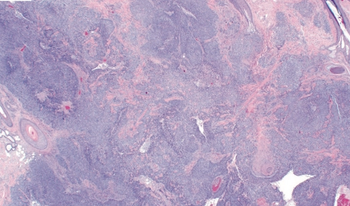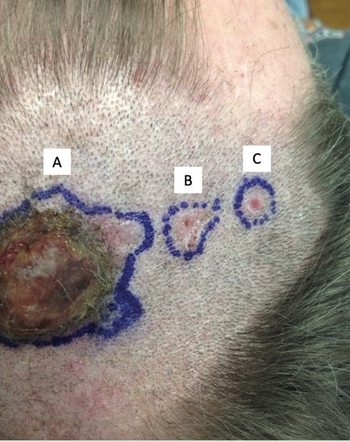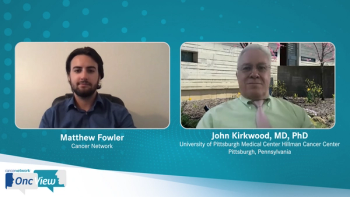
Skin Cancer & Melanoma
Latest News

Latest Videos

CME Content
More News

Patients with unresectable or metastatic melanoma can now receive treatment with nivolumab and relatlimab-rmbw following its approval by the FDA.

Patients with untreated metastatic or unresectable melanoma experienced numerically improved overall survival and response rates as well as long-lasting progression-free survival benefit following treatment with nivolumab and relatlimab.

The phase KEYNOTE-716 trial, which assessed the use of adjuvant pembrolizumab in patients with resected stage IIB and IIC melanoma, met its secondary end point of distant metastasis-free survival.

A recent study found women had a 2-fold higher mortality risk than men when being treated with immune checkpoint inhibitors for advanced melanoma.

Patients with non-melanoma skin cancer achieved promising antitumor activity following treatment with RP1 and nivolumab.

On this episode of the Oncology® Peer Review On-The-Go, Emily Smith, MD, discussed a patient case of basal cell carcinoma she and colleagues published in the journal ONCOLOGY®.

Findings from a study indicated that patients with melanoma who had a high fiber diet experienced better responses to immunotherapy.

John Kirkwood, MD, PhD, discusses the use of immunotherapy as a treatment option for melanoma, including ctDNA, and how to properly monitor responses.

Patients with metastatic cutaneous squamous cell carcinoma who were treated with cosibelimab experienced a positive objective response rate.

Tebentafusp has been approved by the FDA based on results of the phase 3 IMCgp100-202 trial for patients harboring HLA-A*02:01 with metastatic uveal melanoma.

Patients with heavily pretreated metastatic uveal melanoma appeared to benefit from treatment with a synthetic lethal combination of darovasertib and crizotinib.

The RELATIVITY-047 study highlighted a survival benefit with the combination of relatlimab plus nivolumab compared with nivolumab alone for patients with previously untreated advanced melanoma.

The combination of nivolumab plus ipilimumab demonstrated a survival benefit among patients with active melanoma and brain metastases.

Sunil A. Reddy, MD gives his perspective on the article, Metastatic Basal Cell (BCC) Arising from a Primary Cutaneous Carcinosarcoma.

This study presents a case of a man, aged 56 years, found to have a 26-mm exophytic lesion on the vertex scalp identified to contain a distinct population of basal cell carcinoma as well as another population of spindled cells representing a poorly differentiated sarcomatous component.

FoundationOne CDx has been approved by the FDA as a companion diagnostic for patients with melanoma undergoing treatment with a BRAF inhibitor.

Pembrolizumab has been approved by the FDA as an adjuvant treatment for patients with stage IIB or IIC melanoma.

Phase 3 data indicated that the combination of nivolumab and ipilimumab followed by treatment with dabrafenib and trametinib, if necessary, resulted in greater overall survival at 2 years for patients with treatment-naïve BRAF-mutant metastatic melanoma.

Patients with melanoma, head and neck squamous cell carcinoma, and cervical cancer who had not previously received immunotherapy and were treated with lifileucel plus pembrolizumab experienced promising overall response rates compared favorably with historical data on pembrolizumab monotherapy.

Patients with melanoma who have asymptomatic brain metastases had long-lasting responses after being treated with first-line nivolumab and ipilimumab.

Lifileucel, a tumor infiltrating therapy, could be the best treatment for heavily pretreated patients with advanced melanoma, with investigators at Atlantic Health System examining this treatment modality in clinical trials.

UV1 has received fast track designation from the FDA for the use in unresectable or metastatic melanoma.

John Kirkwood, MD, PhD, gives his opinion on duration of treatment for patients with melanoma.

Dr John Kirkwood explores the idea of taking drug holidays during melanoma treatment and whether it is helpful or harmful.

An expert in melanoma cancer treatment examines monitoring patients with melanoma using ctDNA.




































